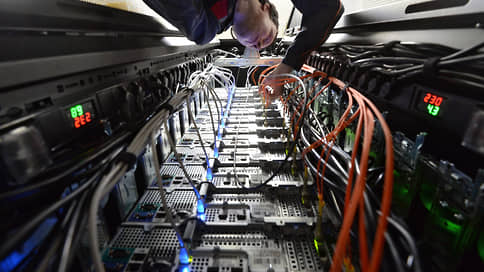Russian electronics manufacturers ask to limit parallel imports
[ad_1]

The Ministry of Industry and Trade, the Ministry of Digital Transformation and Russian electronics manufacturers are discussing new mechanisms to limit its parallel imports. One of the proposals is to ban the import of any servers and data storage systems, without restricting the import of their components: boards, processors, etc. In this way, companies hope, on the one hand, to retain suppliers, and on the other hand, to receive guarantees of demand for investment in new production . However, consumers are sure that high-level equipment will not be produced in the Russian Federation anyway, and in relation to it, the scheme will eventually be reduced to “re-gluing nameplates”.
According to a Kommersant source in a Russian electronics manufacturer, the Ministry of Industry and Trade is discussing with market participants a new scheme to limit parallel imports of equipment. According to him, ANO Computing Technology (ANO VT, it includes Yadro, Aquarius, Kraftway, etc.) suggested that the ministry, while banning the parallel import of all assembled servers and data storage systems (SDS), not restrict the import of components for them: boards, hard drives, processors, etc.
Market participants are trying to stimulate the demand of corporate customers for equipment assembled in the Russian Federation, another interlocutor of Kommersant adds: “The main market for domestic equipment is government orders. Corporate consumers habitually buy Western devices. Now they are trying to change this situation.” In early June, it became known that the Ministry of Industry and Trade was discussing the idea of restricting the import of servers and storage systems of more than 20 foreign brands, including Acer, IBM, Dell (see Kommersant of June 2).
Aleksey Melnikov, managing partner of F+ tech, said that the company is participating in this initiative: “Added value should appear within the country. In the current circumstances, even assembly in Russia is already a plus, as these are new jobs, enterprises, machine tools. According to him, this approach will create guarantees for Russian companies to invest in their own production: “Similar measures can be taken with respect to other devices: smartphones, laptops, etc.”
The appeal of ANO VT has been received and is under consideration, confirmed in the Ministry of Industry and Trade: “The decision to exclude servers and storage systems from the list of goods for parallel import can be made on the basis of reasonable proposals for specific brands, confirmed by figures for the production of similar domestic goods. Specific figures and justifications were not presented in the appeal of ANO VT.” The Ministry of Digital Transformation told Kommersant that if such a proposal is received from the industry, the ministry will “consider its feasibility.”
According to the interlocutor of Kommersant, who is familiar with the data of customs statistics, at the end of 2022, the supply of servers and storage systems in the Russian Federation fell in money by more than 15%, to $ 6.6 billion, and in pieces – by 24%, to 41 million devices . Leading in the import of Chinese brands.
Large consumers really prefer to buy foreign equipment – for example, Sber intends to spend $ 158 million on servers and storage systems from Huawei, Dell and NetApp (see Kommersant of June 26). “Corporate customers tend to work to the last with the equipment on which they have historically built their IT infrastructure. It is logical that in response to this, Russian vendors are trying to accelerate the expansion of their presence in the segment,” says Alexei Zotov, head of IT infrastructure at K2Tech.
Mr. Zotov clarifies that if “with standard server hardware the situation is generally clear” and there are a sufficient number of analogues on the market, then with storage systems it is “more and more difficult”: equipment from Russian manufacturers cannot satisfy the needs of customers who prefer Chinese vendors, such as Huawei and Maipu, or storage systems from unfriendly countries.
In the event of a ban on parallel imports, Russian manufacturers “still will not be able to produce four-processor servers and functional high-speed storage systems that meet the requirements of the register of Russian radio electronics,” Nikolay Kozak, Managing Director for IT and Digital Transformation of DOM.RF, is sure: “Vendors will simply stick stickers, that is, , in fact, will import functional high-speed storage systems as spare parts, assemble and sell under their own brand.” Restrictions, according to him, are justified only if “they will be of a point nature” and are introduced in relation to equipment that has “at least four analogues.”
[ad_2]
Source link





